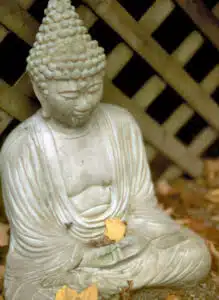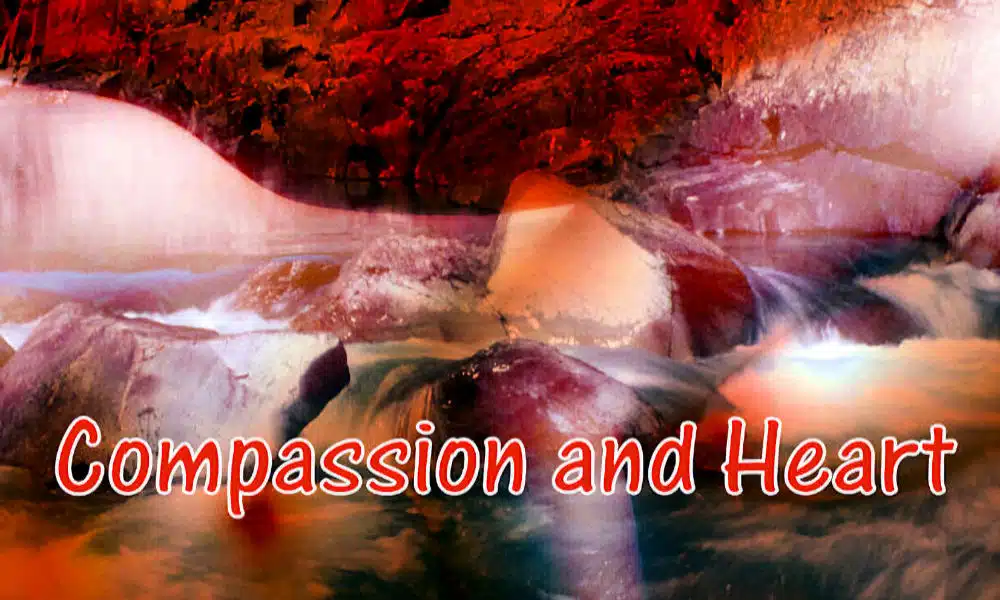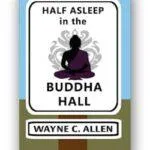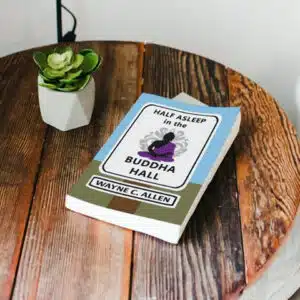Compassion is a misunderstood word. Compassion is sometimes equated with “feeling sorry for,” and is often used as a bludgeon… “If you had an ounce of compassion, you’d look after me and do what I want.” And yet, in the Zen world, the compassionate act could be a kick in the ass. It’s often abrupt, and direct, and challenging.

Want to learn more about living a full and meaningful life?
Want to have the best relationship ever?
Check out my books
Today, we turn to the Heart (4th) Chakra zone — the zone of Compassion
Perhaps it goes without saying, but let me say it anyway.
This series, and pretty much everything else that I write, has to do with self responsibility.

Perhaps the greatest error that people make is to assume that their problems, solutions, passions, and disappointments are somehow connected to something “out there.”
We propose an alternative.
Accept everything, and deny nothing.
Notice, I didn’t say “approve of” everything. We still live in a physical universe, and some stuff needs to be avoided.
On the other hand, I consider it the height of dumb to walk around like Mary Poppins, whistling happy tunes, and hoping that the big bad world will suddenly behave itself, preferably in Technicolor.
It’s an interesting walk, this.
It is “very Zen” to talk about what is, and what is not real.
The short form is that the only thing that is “real” is the here and now, or the present moment.
Past and future are just stories we tell ourselves.
And the joke is, we don’t even have a self.
Brad Warner, wrote a book called “Sit Down and Shut Up,” which is a follow-up to his quite excellent “Hardcore Zen.”
Here are a couple of quotes.
“Self is just a mental construct, an idea, a way of understanding reality, a slot within our heads into which we place a certain portion of what we experience.”
Sit Down and Shut up, Page 21
“There is something, some segment of the vast and wide universe, that you carve out and call “self” and say belongs to “you.” It’s an odd idea, you know, that “you” belong to “you.” When you were very young, you noticed this aspect of the universe, and your parents and teachers and friends all told you in overt and subtle ways that this something was your unique “self.”…
ibid. pp25-26
You accepted this explanation and based your interpretation of all your experiences on this way of looking at things.
…Buddhists claim to have discovered that this ordinary and nearly universally accepted way of looking at things is absolutely untrue…
And they say that if we throw away this false view of things,absolutely every aspect of our lives will become immeasurably better.”
Warner’s book is an exploration of the writings of an old Zen master named Dogen.
Dogen reminds us to always come back to “this concrete place.”
This concrete place is the present moment –
the only thing that is “real” and “for sure.”
Let me quote Warner again.
“Notice he says, “come back” — as if we had somehow left the concrete place where we are right now. How can we ever leave where we are? But we do it all the time. In fact, most of us are sunk so deeply into our own mental images that we can barely even recognize where we are anymore. We need to learn to come back to a place we have never left. It’s absurd. But that’s the way it is.”
ibid. Page 26
So, you may be wondering what any of this has to do with the heart.
Well, there are two things to talk about. First, the heart area, on the chest side, is sort of like a layer cake. Many, many emotions lie dormant and unexpressed in this region. It’s not unusual, when pressing into this zone, to see sadness and grief, anger, then laughter emerge, one after the other.
If you shift to the upper back, specifically the back shoulder muscles (excluding the top of the muscle) and the muscles that lie to either side of the spine between the shoulder blades, you get all the responsibility stuff.
Or perhaps better put, the over-responsibility stuff.
Our language conveys the dual nature of each side of the body.
On the chest side, we get comments like,
- “Her heart wasn’t in it.”
- “It’s hard to trust enough to be openhearted.”
- “He was good hearted.”
- Of course, apparently, hearts swell, and are broken.
- And true feelings are heartfelt.
On the back side, we
- “Shoulder burdens”
- Get our backs up,
- are either spineless or “have spine.”
– all expressions of willfulness, or the lack of it.
Because the heart has always been connected with love, (and boy, there’s a misunderstood word,) and because of the deluded belief that we love the other person (as opposed to our internal representation of the other person) we think that love is something we “do” to others.
In our view, love is simply one more way of being in the world.
Love is actually a verb — an action — a way in which I choose to engage with the world.

Here’s another way of looking at it. I’m always trying to find a reference on Google to the facial expression that is commonly seen in paintings and on statues of the Buddha. I know I read this somewhere, but the Buddha’s smile is called, “The smile of infinite compassion.”
Now, compassion is yet another misunderstood word. Compassion is sometimes equated with “feeling sorry for,” and is often used as a bludgeon — “If you had an ounce of compassion, you’d look after me and do what I want.”
And yet, in the Zen world, the compassionate act could be a kick in the ass. It’s often abrupt, and direct, and challenging.
Infinite compassion is recognizing that we are all the same — we are all caught in the same loop. We are all caught up in making up stories about our past, and fearing our future.
We are caught to the point where we think our imagined version of reality is not only true, but should be swallowed whole by our nearest and dearest.
Or, we equate compassion with rescuing, and exhaust ourselves trying to fix others. And then, we are shocked! shocked! to discover that the recipient of our bogus compassion is neither thrilled, nor changed, but certainly expects us to keep up the rescue. It’s all so nuts.

I’m not going to do what I’ve been doing with this series of articles, and give you five or six suggestions of things you can do.
Rather, I’m just going to suggest, ever again, that you “hit the mat” and start meditating.
The ultimate compassionate act, the clearest and cleanest way to be in the world, is to “be” in the world — in this moment — fully and completely, is to learn to meditate.
From the cushion, you non-critically and nonjudgmentally watch your own mental gymnastics and games. You see your thoughts arise, like bubbles in soda water, insubstantial and meaningless, if you leave them alone. They arise, and they burst.
So what does this have to do with compassion, or “love?”
Everything.
The only truly loving, compassionate act is to be present with another.
Not to fix, not to change, not to blame, not to manipulate. To be with. To “sit with.”
Compassion, then, is being with one’s self while being present with the “world.”
In other words, to be deeply and intimately present with whatever is going on. Without judgment, categorizationand without the need to “do.”
A loving act is an action, but it’s the simplest action of all. Let me quote Brad Warner again.
“Zazen, in spite of its apparent lack of activity in the usual sense, is the purest form of action. It’s action reduced to its barest essentials, the action of simply sitting there and paying attention.… or you could say it’s the balance between thought and feeling. When these two opposing sides are perfectly equal, they cancel each other out, thus causing both body — the material side — and mind — the spiritual side — to appear to drop away.”
ibid. page 45
You could say that love and compassion are encapsulated in sitting with, and paying attention to, both ourselves and our present reality.
One of the ways Darbella and I do this is through what we think of as engaged dialog.
- I speak about what I am doing to myself, the stories I am telling myself, the dramas I am creating, and the emotions I am manifesting. None of what I am doing inside of me has anything to do with her, or the situation. My job is to report what I’m doing.
- Her job, in that moment, is to “simply” sit and listen, without judgment and without attempting to fix anything. Any fixing required would be my responsibility, and only my responsibility, because I’m making the mess I’m sitting in.
- Then, we trade. Darbella talks, and I sit and listen — and strain to resist rushing in with solutions — given who I am, and what I do for a living, this is one of my greatest challenges.
The love and compassion part is the willingness to sit and be present. Again, I say, without judgment. It is what it is.
If your heart’s been hurt, that would be all about you and how you chose to see the situation. Most people hate to hear this. So much easier to blame others, so much easier to shut down, so much easier to curl over and be protected from the cold, cruel world. Except thinking and being this way does nothing more than shut you off from experiencing life.
Once you realize and fully accept that no one can hurt your heart (except for you of course!) it’s just plain silly to have it slammed shut, just in case. All that gets you is physical pain, and the deep and disappointing disconnection from your life and from others.
Be compassionate with your heart. Spend some time silently sitting, being present with yourself, breathing into your heart, and just listening. I have a funny feeling you may be surprised at what you learn.



 Check out my book,
Check out my book,